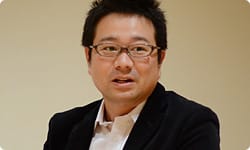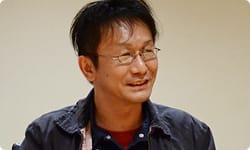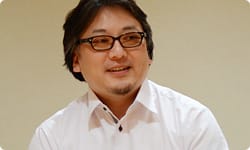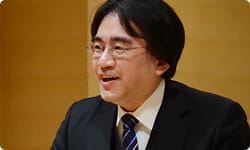An Unprecedented Project
Thank you for coming today.
It's a pleasure.
Today, I have gathered staff members from Sega and Nintendo for a session of "Iwata Asks" to discuss Mario & Sonic at the London 2012 Olympic Games. First, I would like you to say what you worked on for this game, also mentioning any past Mario & Sonic games you may have worked on.
Okay. I'll start. I'm Ohashi, chief producer at Sega. This time, I was responsible for the overall project at Sega. I determined policy, coordinated the development environment, and made big decisions with regard to the game contents. I was involved with everything within the project.
You have been involved with the series since the first game that went on sale, Mario & Sonic at the Olympic Games.1
That's right. I was producer for the first game as well as for the one released later, Mario & Sonic at the Olympic Winter Games.2 We increased the number of development staff this time, so I worked as the chief producer on the Sega side.
1. Mario & Sonic at the Olympic Games™: A sports game released for the Wii console in November 2007 and for the Nintendo DS system in January 2008.
2. Mario & Sonic at the Olympic Winter Games™: A sports game released for the Wii console and Nintendo DS system in October 2009.
You increased the number of development staff. Does that make this game the largest-scale development ever for Sega in the Mario & Sonic series?
Yes. There are more Olympic events this time, and the number of motions for characters that we made is in the tens of thousands.
You say "tens of thousands" as if it's no big deal, but not many games go that far.
No, that's right. Twenty characters appear, and each one has a number of actions equivalent to those of the main character of an action game, so that's why there was such an enormous number.
The characters play a variety of sports—running, jumping, throwing, swimming and hitting—and that requires a large number of motions.
Yes. Supervision of the Mario elements at Nintendo and of the Sonic elements at Sega was necessary, so there was the staff to take care of these supervisions, and someone in charge of Olympic licensing of course, and plenty of people for overseas negotiation, so the number of people kept going up. And the timing of release is important, so…
Right. The London Olympic Games will be held in July 2012.
We had to release it before then, so the 100 people we started with rapidly increased to 130 and then 150.
That's 150 developers just at Sega?
Yes. At its largest point, I think it was over 150.
I see. Kasahara-san?
I'm Kasahara, the director of this game. I was also director of both the Wii and DS versions of Mario & Sonic at the Olympic Games. Then I was director of the DS version of Mario & Sonic at the Olympic Winter Games. I basically make game content, and I also made decisions on gameplay like the controls and game rules, and managed quality control and schedule. I also worked as the liaison with Nintendo.
You have been involved in hands-on development since the first game.
Yes. I've been knee deep for five years! (laughs)
Now would each of you from Nintendo please introduce yourself?
I'm Yamane from Nintendo. I worked as project manager for this title at Nintendo. This was my first time to work on the series, but I tackled the project with an awareness of my abilities gained from always supervising user interfaces, graphics and so on.
I'm Watanabe from Nintendo. I've been involved with every game in the series so far. I was still a new employee at the time of the first game, so I've been involved since my first year.
Throughout your life as a working adult.
Yes. As a result, I have worked with Sega for quite a while. This time, I wanted to be the person who would keep things running smoothly between Nintendo and Sega but I somehow wounded up being the person who just hurled a lot of complaints to Sega! (laughs)
Okay. (laughs) A lot of people have to pour their energy into one single game, so it's never entirely smooth sailing.
That's right.
What's more, both Sega and Nintendo's representative characters appear, it's the Olympic games, which is quite a large setting, and you had to consider how to turn actually-existing sports events into a game, so you had a lot to think about with regard to making the game fun.
You're exactly right.
We make this game like any other now, but looking back, there was a time when common sense dictated it was impossible.
Yes.
Returning to the first game, how did it start at Sega?
I had heard that we had been in talks with Nintendo for a while about doing something with Sonic and Mario. Then Sega acquired the license for the Olympic Games, and we were told to progress with a project for putting the three together.
What were you doing at the time?
I wasn't in the department making Sonic. I was making sports games.
Your specialty was sports games, so it wasn't like you had a special connection with Sonic.
No. Well, to be precise, the first game I worked on after joining the company was Sonic the Hedgehog 3 for the Sega Genesis.3
So you were involved with Sonic. 3. Sonic the Hedgehog 3 for the Sega Genesis: An action game released by Sega Corporation in February 1994. The Sega Genesis is a home console released by Sega in August 1989.
But I was a new employee then. For over ten years after that I never worked on Sonic the Hedgehog, so I might as well not have worked on it at all. When talk of the project came my way, I wondered how I could present it to Nintendo.
To be blunt, the company foisted a bit of an unreasonable task on you.
Yes, that's right. (laughs)
But to you, it was a very important project that you had to do something about.
Yes. We already had the license for the Olympic Games, so I knew we mustn't fail.
Kasahara-san, what was your reaction when you first heard about it?
I thought it sounded fun and interesting. (laughs)
It's a rare opportunity.
Yes. I was motivated to go at it, but at the same time, I thought it would be difficult to pull off. To start off, we wrote a proposal and presented it to Nintendo, but (Shigeru) Miyamoto-san said he wanted to decide after seeing something with Mario and Sonic actually appearing in the Olympic games.
He couldn't decide just on the basis of a plan on paper.
Right. So we went back to Tokyo, made a demo that actually ran, and somehow got the OK.
We were on pins and needles until it was decided.
That's right. I didn't think it would come true! (laughs)
That's how unprecedented it was. Anyway, it was Mario and Sonic's first appearance together, and it was a first to make a game with characters set on a big stage like the Olympic Games.
There was a ton of pressure!





